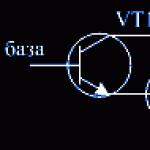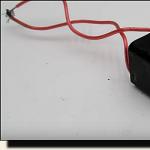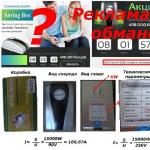Lesson #9
Która jest godzina?
IN modern world You can't do without a watch. We plan our daily schedule, make a to-do list, make appointments, wait for some events - and all this at a certain appointed time. In order to navigate well in the linguistic space of another country, you need to know how time is marked here, be able to name hours and minutes and, of course, answer questions correctly "Która jest godzina?" ("What time is it now?"). Our 9th lesson of the Polish language is dedicated to this topic.
- zegarek- watch
- godzina- hour
- o północy- at midnight
- w południe- at noon
- minute- minute
- early- morning
- dzień- day
- wieczor- evening
- noc- night
- Która jest godzina?- What time is it now?
- O której godzinie?- At what time?

Clock symbols in Polish
Hours in Polish language are indicated in the feminine gender (ending [a]), because the word itself godzina (hour) - female.
- 1:00 - pierwsza
- 2:00 - druga
- 3:00 - trzecia
- 4:00 - czwarta
- 5:00 - piąta
- 6:00 - szósta
- 7:00 - siódma
- 8:00 - osma
- 9:00 - dziewiąta
- 10:00 - dziesiąta
- 11:00 - jedenasta
- 12:00 - dwunasta
- 13:00 - trzynasta
- 14:00 - czternasta
- 15:00 - piętnasta
- 16:00 - szesnasta
- 17:00 - siedemnasta
- 18:00 - osiemnasta
- 19:00 - dziewiętnasta
- 20:00 - dwudziesta
- 21:00 - dwudziesta pierwsza
- 22:00 - dwudziesta druga
- 23:00 - dwudziesta trzecia
- 24:00 - dwudziesta czwarta
Formal and informal style
In Polish there are two ways to indicate the hour: official and informal style. Roughly the same thing happens in Russian. For example, if the clock is now 13:30 , we can say: "thirteen thirty" or "half past two" . The same is true in Polish. We can tell "trzynasta trzydzieści" (official style) or "wpół do drugej" (informal style).
IN official style, which is used in business speech, is called the exact hours and minutes. That is, if on the clock 16:45 then we say "szesnasta czterdzieści pięć" ("sixteen forty-five") . Therefore, if you need to assign some official meeting or agree on important event, you must give the full and exact time.
IN informal style The hours are counted not up to 24, but up to 12, in fact, as in the Russian language. That is, if on the clock 17:20 then we say no" siedemnasta dwadzieścia" ("seventeen twenty") , as in the official style, and "dwadzieścia po piętej" . This style is used in informal, everyday conversations with friends and acquaintances.
Time is very important. Here you will find the departure time of your flight at the airport or train station, a meeting with Polish partners for which you cannot be late, and other important things.
A resourceful reader, of course, may notice that “everyone understands the clock,” after all, you can find out about the departure time from a ticket or information board (it’s also written there in numbers).
So it is, but there are many other cases when you need to understand the time in Polish: ask to be woken up at the hotel, check with your partner on the phone about the time of the meeting, etc.
First of all, you and I need to understand two features:
Unlike the Russian “hour”, which, as is known, male, the Polish word “godzina” - she, i.e. female. In Russian, to indicate time, this is completely unimportant, but in Polish, taking into account the second feature, it is very important.
2. When talking about time, Poles use ordinal numbers to denote hours and cardinal numbers to denote minutes..
Here, by the way, are ordinal numbers, exactly according to the number of hours in a day.
ordinals | liczby porządkowe |
first | pierwszy |
second | drugi |
third | trzeci |
fourth | czwarty |
fifth | piąty |
sixth | szósty |
seventh | siódmy |
eighth | osmy |
ninth | dziewiąty |
tenth | dziesiąty |
eleventh | jedenasty |
twelfth | dwunasty |
thirteenth | trzynasty |
fourteenth | czternasty |
fifteenth | piętnasty |
sixteenth | szesnasty |
seventeenth | siedemnasty |
eighteenth | osiemnasty |
nineteenth | dziewiętnasty |
twentieth | dwudziesty |
twenty first | dwudziesty pierwszy |
twenty second | dwudzesty drugi |
twenty third | dwudzesty trzeci |
twenty-fourth | dwudziesty czwarty |
Therefore, the easiest way to talk about time is to use feminine ordinal numbers (hour), and then cardinal numbers (minutes).
For example, 10:44 – dziesiąta czterdzieście cztery.
15:18 – piętnasta osiemnaście
Please note that when denoting hours after 3:00, we will always use the ending –ta.
In general, it’s not that difficult. The key here is practice. For this very practice, I would recommend that whenever your eyes fall on the clock, think about how you would say it in Polish. At first it won’t be easy, you’ll have to look at the cheat sheets, but after a week everything will go like clockwork. The main thing is not to confuse ordinal (pierwszy, drugi i t.d) and quantitative (jeden, dwa...) numerals.
One “but”. This is the easiest way to talk about time in Polish. I call it “station-airport”. And in fact, we don’t speak Russian among ourselves, it’s “thirteen forty” at home, right?
So the Poles use slightly different constructions in everyday communication, which we will talk about in a week. In the meantime, get more comfortable with it simple option and repeat ordinal numbers - they will come in handy later.
Attention! In Polish, unlike Russian, cardinal numbers change both parts: cf. twenty-first (twenty-first) – dwudziesty pierwszy (dwudziestego pierwszego)… If such a numeral consists of more than three digits, the simplest example is the date, year, then only the last two change. I was born in nineteen eighty-three. – Urodziłem się w tysiąc dziewięćset osiemdziesiątym trzecim roku.
Therefore, 23:00 – (godzina) dwudziesta trzecia and certainly not dwadzieścia trzecia!
Russian-Polish phrasebook - a cheat sheet for tourists traveling around Poland. A short phrasebook with pronunciation includes words and phrases commonly used in speech, which may be useful for independent travelers to navigate in cities, communicate in hotels, restaurants and shops.
First of all, it’s worth noting and remembering polite phrases - using them will help you win over your interlocutor. Please note that contact strangers follows in the third person (pan/pani).
If you are going to visit non-tourist canteens and restaurants where mainly locals dine, be prepared for the fact that the menu may be exclusively in Polish. In this case, not only a phrasebook, but also a wider list of main dishes with explanations in Russian will be very useful.
Some words in Polish may seem similar in their spelling and sound, but their meaning is not always predictable. For example, Polish pierogi are dumplings that can have a variety of fillings, and sklep is a regular store. There are quite a lot of similar cases, and a Polish phrasebook, supplemented by an offline dictionary, will help, if possible, avoid translation incidents.
The table below shows the original spelling of words and phrases, as well as approximate pronunciation - based on transcription.
Common phrases
| Hello ( Good morning, Good afternoon) | dzień dobry | J'en are kind |
| Good evening | dobry wieczor | good evening |
| Good night | dobranoc | dobranets |
| Hello | cześć | cheschch |
| Goodbye | do widzenia | until Wizen |
| Thank you | dziękuję / dziękuję bardzo | j"enkue / j"enkue barzo |
| Sorry | przepraszam | psheprasham |
| Bon appetit | smacznego | delicious |
| Yes | so | So |
| No | nie | Not |
Transport
| Station | stacja | statsya |
| Stop | przystanek | Przystanek |
| Train Station | dworzec kolejowy | king of the rut |
| Airport | lotnisko | letnisko |
| Bus station | dworzec autobusowy | the bus man |
| Transfer | przesiadka | pshesadka |
| Luggage storage | przechowalnia bagażu | pshechovalnya luggage |
| Hand luggage | bagaż podręczny | luggage |
| Arrival | przybycie | Przybycze |
| Departure | clothing | dressier |
| Cash register | kasa | casa |
| Ticket | ticket | ticket |
| Can you call a taxi? | Czy moze pan(i) przywolac takso’wke? | Chshi mozhe pan(i) pshivolach taksufke? |
At the hotel
In a restaurant, canteen, store
| Soup | zupa | Zupa |
| Snack | przystawka | pshishtavka |
| Hot dish | Danie Gorące | Dana Gorontse |
| Garnish | dodatki | extras |
| Beverages | napoje | drunk |
| Tea | herbata | herbata |
| Coffee | kawa | kava |
| Meat | mięso | menso |
| Beef | wolowina | whoa |
| Pork | wieprzowina | Wepszowina |
| Chicken | kurczak | kurchak |
| Fish | ryba | fish |
| Vegetables | warzywa | vazhiva |
| Potato | ziemniaki | dugouts |
| The check, please | Prosze o rachunek | Ask about rahunek |
| Shop | sklep | crypt |
| Market | rynek | market |
| Dining room | jadalnia | food shop |
| What is the price...? | Ile kosztuje...? | Ile Kostue...? |
Months
Days of the week
Numbers
| 0 | zero | zero |
| 1 | jeden | eden |
| 2 | dwa | two |
| 3 | trzy | tshi |
| 4 | cztery | chters |
| 5 | pięć | pench |
| 6 | sześć | sheshchch |
| 7 | siedem | we are generous |
| 8 | osiem | generally |
| 9 | dziewięć | j"wench |
| 10 | dzesięć | j "yeschench |
| 100 | sto | one hundred |
| 1000 | tysiąc | thousand |
Która jest godzina? This question, despite all its simplicity, can confuse a person. Almost every Polish textbook for beginners touches on this topic, with many examples, pictures and audio files. And it seems that looking at the pictures everything is clear and understandable, but when trying to determine the time without clues, for some reason many difficulties arise.
There are 2 ways to answer the question “Która jest godzina” (What time is it?) in Polish:
1. Official (simply numbers are spoken; used most often when announcing the schedule, for example at a train station, in the cinema, on TV, etc.):
For example: 15.30 — piętnasta trzydzieści
2. Unofficial (used various designs; used in normal conversations)
For example: 15.30 – wpół do czwartej
Attention!
There are 4 constructions in total with which we can tell what time it is. They depend on the position of the minute hand on the dial (i.e. minutes).
1. If now is an even number of hours, without minutes, i.e. minute hand at zero, (for example 14.00) then we say “druga”. Pay attention to the ending -a, it is assumed that this is “godzina druga”, only the word “godzina” may not be used. Optional. Also note that in the informal notation of time there are only 12 hours.
Examples:
12.00 – dwunasta (twelve)
23.00 — jedenasta (eleven)
14.00 - druga (two)
2. If the big arrow is now at 6, i.e. half an hour(for example 16.30), then we use the construction “wpół do” - “wpół do piątej”. In Russian it sounds like “half past four”, in Polish it translates about the same. Again, I draw your attention to the ending -ej.
Theoretically, this is a shortened form of “wpół do piątej godziny”, but again we say the word “godzina” at will.
Examples:
19.30 - wpół do ósmej (half past eight)
15.30 - wpół do czwartej (half past three)
5.30 – wpół do szóstej (half past five)
Now let's talk about possible timing.
Mentally divide the watch dial into 2 halves:
a) up to 30 minutes
b) after 30 minutes
Depending on which half of the clock the large (minute) hand is located, there are two designs:
3. If the minute hand is in the first half of the dial (up to 30 minutes), the construction with the preposition “po” (“after”) is used. For example, 17.15 - “piętnaście po piątej”.
Again, this is a short form of the construction “piętnaście minut po piątej godzinie”, which can be literally translated as “fifteen (minutes) after the fifth (hour)”.
I draw your attention to the fact that it must be said in this order: the number of minutes » the preposition “po” » the number of hours with the ending -ej.
Examples:
18.10 — dzisięć po szóstej
7.05 — pięć po siódmej
3.17 — siеdemnaście po trzeciej
4. If the minute hand is in the second half of the dial (after 30 minutes), the construction with the preposition “za” (“without”) is used. For example, 17.45 - “za piętnaście szósta”.
Again, this is a short form of the construction “za piętnaście minut szósta godzina” which translates as “at fifteen (minutes) to six (hour)”
I draw your attention to the fact that it must be said in this order: the preposition “za” » number of minutes » number of hours with the ending -a.
Examples:
16.45 - za piętnaście piąta (fifteen to five)
10.55 — za pięć jedenasta (five minutes to eleven)
8.35 — za dwadziścia pięć dziewiąta (twenty-five to nine)
So, you need to understand and remember only 4 constructions, and you will always be able to answer the question “Która godzina?”
1) 14.00 - druga (if 00 minutes)
2) 15.30 - wpól do czwartej (if half an hour)
3) 19.15 — piętnaście po siódmej (if up to 30 minutes)
4) 23.40 - za dwadzieścia dwunasta (if after 30 minutes)
A few notes (not required, but recommended):
1) Expressions such as “północ” (midnight) and “południe” (noon) are used quite often in Polish.
2) Just like in Russian, “15 minutes” can be replaced by the word kwadrans (quarter).
Examples:
9.15 — kwadrans po dziewiątej (a quarter after nine)
13.45 - za kwadrans druga (a quarter to two)
3) There are more complex designs time designations, for example (the word “jest” can be placed before the time, or it can be omitted):
12.01 — Jest minuta po dwunastej (a minute after twelve)
12.31 — Jest minuta po wpół do pierwszej (a minute after half past twelve)
12.25 — Jest za pięć wpół do pierwszej (five minutes to half past twelve)
12.59 — Jest za minutę pierwsza (without a minute for the first hour)
On sale at Domsporta
watch- watch … Nanai-Russian dictionary
watch- a device for measuring current time (in seconds, minutes, hours). Ancient man oriented in time by the Sun. Naturally, the first hours were sunny. In the simplest sundial, time was counted by the position of the shadow from the rod... Encyclopedia of technology
WATCH- WATCH. The simplest and oldest clock is the sundial. They were a tall pillar (even an obelisk), placed vertically. The time of day was determined by the shadow of the obelisk (length and position) and the dial drawn on the ground. For changing… … Concise encyclopedia household
watch- noun, plural, used very often Morphology: pl. What? watch, (no) what? hours, what? hours, (see) what? watch, what? for hours, about what? about watches 1. A watch is a device, usually round or square shape, with which you determine the exact... Dictionary Dmitrieva
watch- watch. Among household items, watches are distinguished by a particularly wide variety of shapes, appearance, sizes used finishing materials. The most common table clocks are alarm clocks, in which, in addition to the main clock... ... Encyclopedia "Housing"
watch- ov; pl. A device, a mechanism for determining time within a day. Gold watches. Pocket watches. Wall watches. Wind up watches. The clock is ten minutes past ten. The hour struck midnight. Clock dial. Ch. are running (hurrying). ◊ Hourglass. Reading device... ... encyclopedic Dictionary
Watch- Watch. Electronic (male and female) and electronic mechanical wrist watch. CLOCK, a device for measuring the current time. To keep track of time, clocks use constant periodic processes: rotation of the Earth (sundial), oscillations... ... Illustrated Encyclopedic Dictionary
WATCH- a device for keeping time. Clocks use constant periodic processes: the rotation of the Earth (sundial), oscillations of a pendulum (mechanical and electromagnetic clocks), tuning forks (tuning fork clocks), quartz plates (quartz clocks), ... ... Big Encyclopedic Dictionary
watch- the first, third, sixth and ninth hours, from sunrise, at which ancient Christians gathered to pray; the church combined psalms, verses and prayers of the first hour with Matins, the third and sixth with the Liturgy, the ninth with Vespers (Dal, hour) See... ... Synonym dictionary
WATCH- CLOCK, a device for measuring time. In the most ancient structures there were no moving parts for keeping time. An example is the Neolithic stone pillars and the sundial of the ancient Egyptians. The Egyptians also used water clocks... Scientific and technical encyclopedic dictionary
WATCH- We are crucified on the clock dial. Stanislav Jerzy Lec The clock hands are two hands that take away our time. Grzegorz Stańczyk Listening to the ticking of a clock, we notice that time is ahead of us. Ramon Gomez de la Serna The broken clock shows twice a day... ... Consolidated encyclopedia of aphorisms
Books
- Clock, Agatha Christie. It happens that a famous detective has to investigate a case that has already been “solved”. This is exactly what happened with the murder of an elderly woman in the novel “Miss McGinty is Dead,” and Poirot will have to...




